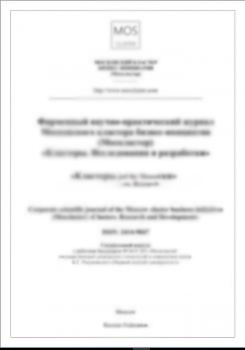АНО "Научно-исследовательский Центр Физико-технической информатики"
АНО ВО "Российский Новый Университет"
МИРЭА - РТУ
Москва, г. Москва и Московская область, Россия
ГРНТИ 50.07 Теоретические основы вычислительной техники
ББК 3297 Вычислительная техника
Nuclear power plants, being complex technological systems, represent a source of increased risk, in particular, a specific risk of radiation exposure. Obtaining quantitative assessments of radiation risk is critical for risk reduction and accident prevention. Existing methods for assessing radiation risk do not take into account the influence of external factors, such as population composition, geographical features, anthropogenic environmental changes, etc. The result of the risk analysis is the assessment of physical and economic indicators for the Rostov and Kalinin NPPs, taking into account the age composition of the population, as the most significant parameter. Based on a comparison of the estimates obtained with the results without taking into account the age distribution, recommendations are given on the use of adjusted estimates when developing measures to reduce risk and mitigate the consequences for the most sensitive age groups of the population (1-12 years). The objective of the work is to modify the methodological approach to the calculation of radiation risk indicators of the population, taking into account the age composition and the practical application of the formulas for assessing the physical and economic indicators of damage to real objects.
risk, population, NPP, dose, age composition, damage, safety
1. On approval of a typical safety data sheet of a hazardousobject: [Order of the Emergencies Ministry of Russia No.506 of November 4, 2004]. - M., 2004. - 1 p.
2. Safety data sheet of the critical (dangerous) object ofRosatom: [order of the Ministry of Emergency Situations ofRussia No. 506 of November 4, 2004]. - M., 2006. - 9 p.
3. Methodology for assessing risk indicators for managing thesafety of critical (hazardous) facilities of ROSATOM[:Methodology: Approved by the First Deputy DirectorGeneral of the State Atomic Energy CorporationROSATOM for the nuclear weapons complex on March 29,2016]. - M., 2016. - 253 p.
4. Rapid assessment of radiation doses to the public in case ofradioactive contamination of the territory by air: [Guidelines MU 2.6.1.2153-06: approved by the Chief StateSanitary Doctor of the Russian Federation on 04.12.2006].- M., 2007. - 90 p.
5. Kabanov, L.P., Berberova, M.A., and others. Riskassessment of a reference nuclear power plant with a VVER(operating unit of a nuclear power plant with a VVER -1000): a report on research and development reg. №1821OT10 // International Nuclear Safety Center - M.,2010. - 132 p.
6. Zhukov, I.V., Berberova, M.A., and others. Developing alist of safety management measures and assessing riskindicators for Stage 2 of the Kalinin NPP with a WWER1000 reactor (V-320): a research report on reg. No.2339OT12 // International Nuclear Safety Center - M.,2012. - 109 p.
7. Procedural Guidelines for Risk Assessment of HazardousIndustrial Facilities. Series 27. Issue 16. - M.: Closed JointStock Company “Scientific and Technical Center forIndustrial Safety Research”, 2016. - 56 p.
8. SanPiN 2.6.1.2523-09. Radiation safety standards (NRB99/2009). Approved by the Resolution of the Chief StateSanitary Doctor of the Russian Federation // No.47 of07.07.2009. - M., 2009. - 75 p.
9. Recommendations of the International Commission onRadiation Protection from 2007: [ICRP Publication 103:approved March 2007]. - Moscow: Proceedings of theICRP, 2009. 344 p





